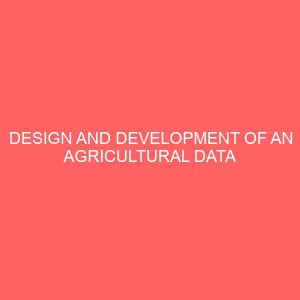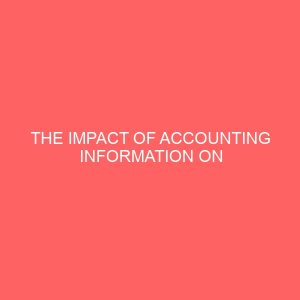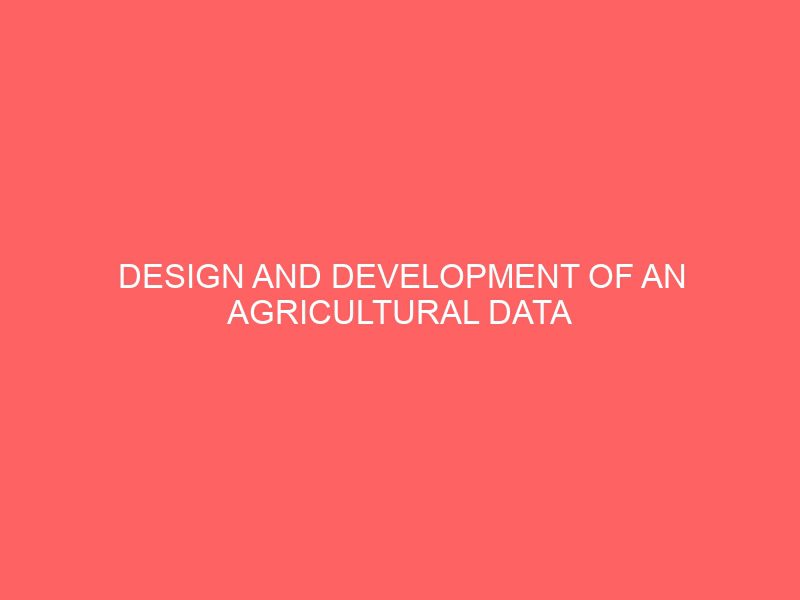Description
CHAPTER 0NE
INTRODUCTION
1.1 Background of Study
An agricultural data integration and management system refers to set of software’s and hardware’s that serve as tools for gathering, storing, processing and consuming data from diverse sources in other to use agricultural information to make strategic, tactical and operational decision on both long term and short-term bases (Alapa, 2013). An agricultural data integration and management system is meant to contain a database and collection of applications to help manage the data collected from different farms and farmers respectively.
Agriculture has remained the nation’s main economic bedrock employing 70 – 80 percent of the total population, mostly on a subsistence level (Asiabaka, 2000). However, in spite of the potentialities and prospects of producing food and population growth is a serious problem in Nigeria today. According to (Agbanewo et al., 2005), sequel to the food situation in many developing societies, which are predominantly agricultural, finding how to raise productivity among the rural poor in these countries have become of the two or three most urgent questions confronting the International development community today.
Agricultural development using technology implies a shift from traditional methods of production where for instance a crop famer acquires or tilts his own land, gets seeds from the market, without knowing the variety, plants them, use fertilizer without minding its content and finally waiting for harvest. With technology now, there are new technological components that give a proper direction to farming and farmers in general, such as knowing better varieties possibly advertised by the Ministries of Agriculture, knowing better farming practices, having access to fertilizers even from the comfort of their homes, pesticides as well as and also knowing a ready market that will need their products so as to avoid wastage after a hard time of production (Agbanewo et al., 2005). All this changes and improvements can be thought about and implemented with the introduction of Technology, as the government and developing partners in the Agricultural Industry will not have to go physically to every farm in the Rural Area to understand their plights, with phone calls, with snapshots of seeds, Pesticide containers and giving out information’s of different kinds, farmers are expected to better see value for their productions.
In the present technology-based and data driven world of business, data have swiftly become the raw material of production, an innovative source for enormous socio-economic value (Tene et al., 2013). The flow of data and information between databases, information systems, processes etc., conveys the capability that can make an organization to be cost effective, efficient and more importantly competitive (The MITRE Corporation, 2016). Consequently, effective data management throughout its lifecycle provides a foundation not just for effective and robust processes but also for a competitive edge in the global market. Social economic activities have been broadened globally due to technological development (Chandrasekhar et al., 2001). This rapid development and recent advancement of modern ICT can be considered as drivers for globalization (Johansson et al., 2015).
1.2 Statement of Problem
The following is the statement of the problem for this research;
Farmers in the rural areas tend not to enjoy the value of their hard work, as this is evident with the poor manner they live in their villages. Travelling through the North Central region of Nigeria during the fruit seasons for instance, one would see heaps of mangos, tomatoes, cashews etc, rotting away on the road side when demand for these produce are very high in the cities. This information gap can be alleviated if an agricultural data integration and management system is made available for both the farmers to publish (with the clicks of a few buttons) the location, type of produce and even cost per kilograms of the produce. The proposed system will also help buyers or middlemen locate produce, and have an idea of the condition of these produce and the cost per kilogram of the produce. Consequently buyers can make informed decision on what to buy and what not to buy (Ubah, 2017).
1.3 Aim and Objectives
The aim of this project is to design and develop an Agricultural data integration and Management System for Famers in Rural North Central Nigeria, as it would provide external bodies like non-governmental organisations, international agencies and government departments with data that could help for budgeting, planning, outreaches and others. It should also help the farmers to analyse their data to make strategic, tactical and operational decision that will benefit them.
The following are the Objectives;
- The proposed project seeks to reduce the waste in the agriculture industry by helping buyer locate farmers with the produce that they hope to sell.
- Farmers can even publish data and strike a deal with prospective buyers before harvest of produce.
- The proposed system should help reduce food price on the long run, therefore benefiting the consumers.
- The proposed system would help farmers sell their products to their target buyers.
- Furthermore, the proposed system would help farmers build good rapport with buyers of their produce while reducing cost.
- The research is meant to look into previous literature reviews from other researchers.
- To analyze the impact that the Android Application will have towards farming.
- To design using UML the structure of how the program will function.
- To implement the and design an Android based program that will be used for data collection.
1.4 Scope of the study
This project is purposely designed to focus on providing an Agricultural Data Integration and Management System for Famers in Rural North Central Nigeria, after careful analysis of what seem to be the critical problems affecting them. Also, it can further be adopted by regions in Nigeria.
1.5 Limitation of the study
Limitations to this research was basically Time and access to educational resources from past research conducted in relation to this study.
1.6 Definition of Terms
Agriculture: the science or practice of farming, including cultivation of the soil for the growing of crops and the rearing of animals to provide food, wool, and other products.
Management: the process of dealing with or controlling things or people.
System: a set of things working together as parts of a mechanism or an interconnecting network; a complex whole.
Farmer: a person who owns or manages a farm.
Rural Area: A rural area or countryside is a geographic area that is located outside towns and cities.
Data: facts and statistics collected together for reference or analysis.
Data Integration: Data integration is the combination of technical and business processes used to combine data from disparate sources into meaningful and valuable information.








Reviews
There are no reviews yet.